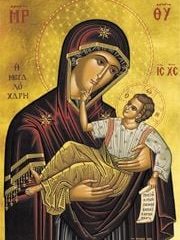But when the Counselor comes, Whom I shall send to you from the Father, even the Spirit of truth, Who proceeds from the Father, He will bear witness to Me.
John 15:26
In the year 589 A.D., the Latin word “Filioque”, meaning “and the Son” was added to the Nicene Creed at the Council of Toledo. The Filioque changes the words of the Creed so that the Holy Spirit “proceeds from the Father and the Son, and together with the Father and the Son is worshipped and glorified.”
This phrase was not included in the original draft of the Nicene Creed in 325, or in its final edited version in 381. The Fourth Ecumenical Council in Chalcedon in 451 affirmed that no changes would be made in the Nicene Creed and how the faith is expressed in it.
It is interesting that both the Orthodox Church (our Creed does not include the Filioque) and the Roman Catholic Church (which includes the Filioque in their version of the Nicene Creed) both argue their positions off John 15:26, which is quoted above. From the Orthodox viewpoint, we confess that the Counselor (the Holy Spirit) “proceeds from the Father” not “the Father and the Son.” From the Catholic viewpoint, when Jesus says in reference to the Counselor “Whom I shall send to you from the Father,” it is implied that the Son is also cooperating in sending the Spirit, which is proceeding from the Father, so the Father and the Son are working together to send the Spirit, He proceeds from both Father and Son.
There was a time when some of the Church Fathers, even in the Orthodox Church, used “proceeds from the Father through the Son”. This appears in some writings but was eventually rejected. This phrase never made it into the Creed.
The Filioque controversy was one of the earliest “shots across the bow” between the church of Rome and the church of Constantinople. Acrimony continued and increased between the two churches until the final split occurred between them in 1054, an event referred to historically as “The Great Schism.”
Most people don’t really think about the Filioque controversy. The Son proceeding from the Father and the Son or the Father alone is a matter that most leave for the theologians. The fact is that if someone adds or subtracts something from the Creed, the confession of faith is no longer the same, there is no more unity between the two churches. There are several doctrinal and many more practices that differ between the Roman Catholics and the Eastern Orthodox. The two churches did not speak or associate with one another between 1054 and 1965 when the mutual anathemas were lifted. Communion between the two churches has not been restored. Many things would have to happen if Communion ever was to be restored between the two churches, including examination and elimination of the Filioque.
While the Holy Spirit proceeds from the Father alone, according to the Nicene Creed, as drafted in and edited to its final form in 381, the Holy Spirit is worshipped and glorified along with the Father and the Son. Each time we end a prayer, it is with the Trinitarian doxology, “Father, Son and Holy Spirit, now and forever and to the ages of ages.” This phrase points to both the equality of the Trinity, as well as the timelessness of God (in Trinity), Who has no beginning and no ending.
The Feast of Pentecost in the Orthodox Church celebrates the descent of the Holy Spirit on the Apostles, and includes a special vespers affectionately called “The Vespers of the Descent of the Holy Spirit.” This is the first time since Pascha when we will kneel again. It is interesting to note that we connect kneeling in the Orthodox Church with the Holy Spirit. We kneel to receive absolution at the sacrament of confession as the grace of the Holy Spirit descends on us to absolve our sins. We kneel, even during the Paschal season, when the sacrament of ordination takes place, as the Holy Spirit comes down on a man to ordain him to one of the major orders of clergy. We kneel, outside of the Paschal season, at the consecration of the Gifts at the Divine Liturgy, because the Holy Spirit is the one who consecrates them. Yet, we stand to receive the Body and Blood of Christ, the Eucharist, the consecrated Gifts.
The Holy Spirit supplies all things: He pours out prophecies, He perfects priests; He taught wisdom to the unlettered, He showed fishermen to be theologians; He welds together the whole institution of the Church. “O Comforter, You who share the same essence and throne with the Father and the Son, glory to You!” (From the Vespers of Pentecost, Trans. by Fr. Seraphim Dedes)
It is the Orthodox teaching, confirmed in the original and unedited Nicene Creed, that the Holy Spirit proceeds from the Father, and together with the Father and the Son is worshipped and glorified. The Orthodox Church is the only church that confesses the original Creed of Nicaea in 325, that was edited to its current and final form in 381 at the Second Ecumenical Council held in Constantinople.

0 Comments